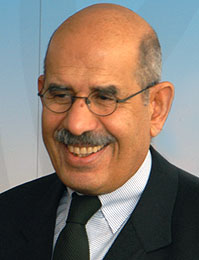A New Wind Blows in Egypt
Dr. Mohammed ElBaradei is becoming the Middle East’s progressive voice

“Western policy towards this part of the world has been a total failure, in my view. It has not been based on dialogue, understanding, supporting civil society and empowering people, but rather it’s been based on supporting authoritarian systems as long as the oil keeps pumping.
“If you bet on individuals, instead of the people, you are going to fail. And Western policy so far has been to bet on individuals, individuals who are not supported by their people and who are being discredited every day.” – Former IAEA Director-General and potential presidential candidate Mohammed ElBaradei, in his first English-language interview since returning to Cairo in Feb. (The Guardian, 31 March 2010)
Dr. Mohammed ElBaradei is quickly becoming the Middle East’s most prominent progressive voice. Candidly and calmly articulating beliefs long held by average citizens, he does so not from a faraway think tank in the United States or Europe, but from the very heart of the Arab world.
Defying the Egyptian government’s ban on non-state sanctioned public gatherings, ElBaradei is attracting increasingly large crowds as he takes his message of reform to Cairo’s streets and most recently, to the Nile Delta. Decrying the West’s support for the region’s authoritarian regimes in the midst of Egyptian President Hosni Mubarak’s security services is also no small undertaking, but ElBaradei has done it with poise and courage.
As Egypt gears up for its 2011 presidential election, ElBaradei has called on fellow countrymen to join his newly established National Front for Change. He has also asked they add their name to a petition calling for reforms that would, for example, overturn constitutional roadblocks erected by Mubarak curtailing the ability of independents like himself from running. ElBaradei has yet to announce whether he will stand as a candidate in the upcoming ballot, however.
In his first public appearance outside Cairo near the provincial capital of Mansoura, he said to a crowd of 1,500 supporters, “You are the owners of this country. Whatever our belief or religion is, every one of us has a piece of this country and has the right to lead a decent life … it does not make sense that until now 40 percent of the people are below [the] poverty line and 30 percent are illiterate. Social justice is almost non-existent in Egypt, and the gap between the rich and poor is widening …”
Emphasizing that basic constitutional reforms are the key to political change in Egypt (such as lifting Emergency Law which prohibits exactly the type of gathering at which he spoke), ElBaradei succinctly stated his mission: “We seek peaceful reform … we seek constitutional amendments and free and fair elections. The Egyptian citizen has the right to choose his president.”
As the opening quote illustrates, ElBaradei clearly identifies why U.S. and European Middle East policy has failed. Although neo-conservatives have hijacked the narrative of bringing democracy to the region by ending the rule of repressive regimes, what separates ElBaradei is that he understands the “Arab street” and has tapped into the deep, reverberating feelings of it.
“I see increasing radicalization in this area of the world, and I understand the reason. People feel repressed by their own governments, they feel unfairly treated by the outside world, they wake up in the morning and who do they see—they see people being shot and killed, all Muslims from Afghanistan, Iraq, Somalia, Sudan, Darfur.”
What ElBaradei appreciates and the “neo-cons” fail to, is that if politically empowered, the people would have exceptionally little in common with the self-styled, pro-Israel “liberators” of the Middle East.
During the 2008-2009 Israeli invasion of Gaza—in which Egyptians were prevented from demonstrating, raising money, or even blogging in support of besieged Gazans—if the Arab masses were not muffled into silence by governments that felt their best interests lie in siding with the U.S., the line of people rushing to Gaza’s aid would extend from Morocco to Iraq.
With a reputation as an even-handed, fair-minded individual working solidly in his favor, ElBaradei has the ability to dramatically alter the trajectory of Middle East politics. Speaking forcefully and compellingly against an entrenched and self-perpetuating political system, if successful, what he does for Egypt will resonate throughout the Arab world.
And for this reason, and notwithstanding the political system rigged against him, all the region’s authoritarian rulers hope ElBaradei will fail in his quest to motivate the Egyptian masses and galvanize them into action, for fear their own rule will then be in jeopardy.
“The state may be a centralized power but the people are stronger,” he said.
As the new wind brought by ElBaradei blows across Egypt’s political landscape, the outcome of the 2011 election will determine if his truism becomes reality.
Rannie Amiri is an independent Middle East commentator. He may be reached at: [email protected].

